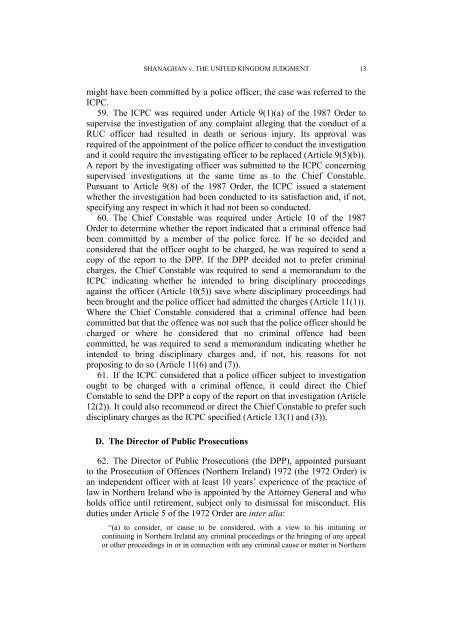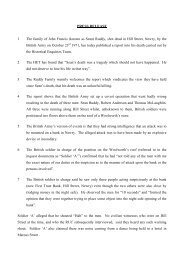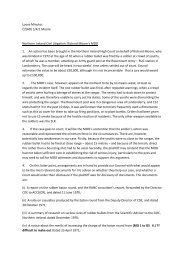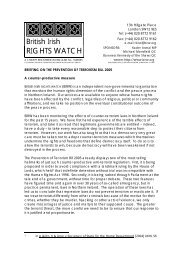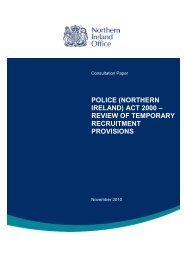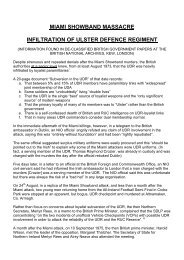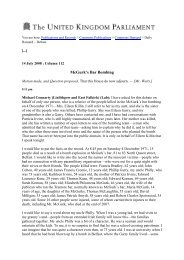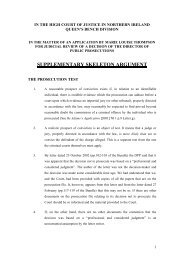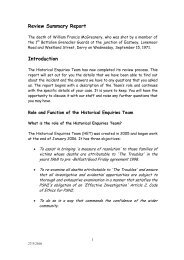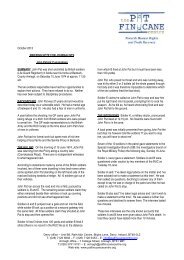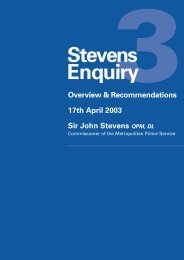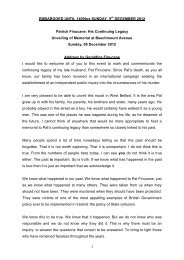Patrick Shanaghan v the United Kingdom - The Pat Finucane Centre
Patrick Shanaghan v the United Kingdom - The Pat Finucane Centre
Patrick Shanaghan v the United Kingdom - The Pat Finucane Centre
You also want an ePaper? Increase the reach of your titles
YUMPU automatically turns print PDFs into web optimized ePapers that Google loves.
SHANAGHAN v. THE UNITED KINGDOM JUDGMENT 13<br />
might have been committed by a police officer, <strong>the</strong> case was referred to <strong>the</strong><br />
ICPC.<br />
59. <strong>The</strong> ICPC was required under Article 9(1)(a) of <strong>the</strong> 1987 Order to<br />
supervise <strong>the</strong> investigation of any complaint alleging that <strong>the</strong> conduct of a<br />
RUC officer had resulted in death or serious injury. Its approval was<br />
required of <strong>the</strong> appointment of <strong>the</strong> police officer to conduct <strong>the</strong> investigation<br />
and it could require <strong>the</strong> investigating officer to be replaced (Article 9(5)(b)).<br />
A report by <strong>the</strong> investigating officer was submitted to <strong>the</strong> ICPC concerning<br />
supervised investigations at <strong>the</strong> same time as to <strong>the</strong> Chief Constable.<br />
Pursuant to Article 9(8) of <strong>the</strong> 1987 Order, <strong>the</strong> ICPC issued a statement<br />
whe<strong>the</strong>r <strong>the</strong> investigation had been conducted to its satisfaction and, if not,<br />
specifying any respect in which it had not been so conducted.<br />
60. <strong>The</strong> Chief Constable was required under Article 10 of <strong>the</strong> 1987<br />
Order to determine whe<strong>the</strong>r <strong>the</strong> report indicated that a criminal offence had<br />
been committed by a member of <strong>the</strong> police force. If he so decided and<br />
considered that <strong>the</strong> officer ought to be charged, he was required to send a<br />
copy of <strong>the</strong> report to <strong>the</strong> DPP. If <strong>the</strong> DPP decided not to prefer criminal<br />
charges, <strong>the</strong> Chief Constable was required to send a memorandum to <strong>the</strong><br />
ICPC indicating whe<strong>the</strong>r he intended to bring disciplinary proceedings<br />
against <strong>the</strong> officer (Article 10(5)) save where disciplinary proceedings had<br />
been brought and <strong>the</strong> police officer had admitted <strong>the</strong> charges (Article 11(1)).<br />
Where <strong>the</strong> Chief Constable considered that a criminal offence had been<br />
committed but that <strong>the</strong> offence was not such that <strong>the</strong> police officer should be<br />
charged or where he considered that no criminal offence had been<br />
committed, he was required to send a memorandum indicating whe<strong>the</strong>r he<br />
intended to bring disciplinary charges and, if not, his reasons for not<br />
proposing to do so (Article 11(6) and (7)).<br />
61. If <strong>the</strong> ICPC considered that a police officer subject to investigation<br />
ought to be charged with a criminal offence, it could direct <strong>the</strong> Chief<br />
Constable to send <strong>the</strong> DPP a copy of <strong>the</strong> report on that investigation (Article<br />
12(2)). It could also recommend or direct <strong>the</strong> Chief Constable to prefer such<br />
disciplinary charges as <strong>the</strong> ICPC specified (Article 13(1) and (3)).<br />
D. <strong>The</strong> Director of Public Prosecutions<br />
62. <strong>The</strong> Director of Public Prosecutions (<strong>the</strong> DPP), appointed pursuant<br />
to <strong>the</strong> Prosecution of Offences (Nor<strong>the</strong>rn Ireland) 1972 (<strong>the</strong> 1972 Order) is<br />
an independent officer with at least 10 years’ experience of <strong>the</strong> practice of<br />
law in Nor<strong>the</strong>rn Ireland who is appointed by <strong>the</strong> Attorney General and who<br />
holds office until retirement, subject only to dismissal for misconduct. His<br />
duties under Article 5 of <strong>the</strong> 1972 Order are inter alia:<br />
“(a) to consider, or cause to be considered, with a view to his initiating or<br />
continuing in Nor<strong>the</strong>rn Ireland any criminal proceedings or <strong>the</strong> bringing of any appeal<br />
or o<strong>the</strong>r proceedings in or in connection with any criminal cause or matter in Nor<strong>the</strong>rn


